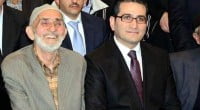Can resurrecting the caliphate solve Muslims’ problems?

Date posted: January 13, 2015
AYDOĞAN VATANDAŞ
The recent terrorist attacks in Paris once more brought up the issue of how homegrown terrorism is shaping up to be one of the most striking elements of today’s terror threat, as former US Department of Homeland Security Secretary Janet Napolitano predicted in 2011.
As I pointed out in my previous article (“Why are they becoming terrorists?” Today’s Zaman, Jan. 8), the available data explicitly indicate that the individuals affiliated with homegrown terrorism that is motivated by a Salafi jihadist interpretation of Islam are not necessarily connected to religiosity and are often ignorant about Islam, but are instead under the influence of a process of radicalization.
Peter Neumann and Brooke Rogers describe the radicalization process as “the changes in attitude that lead towards sanctioning and, ultimately, the involvement in the use of violence for a political aim.” However, it is necessary to note that not all radical ideologies necessarily cause violence or approve of violence. Likewise, while some Salafi jihadist groups approve of using violence to reach their political goals, some do not and prefer to organize and struggle in the form of political parties.
For example, Egypt’s Nour Party is known as a Salafi party which supported President Abdel-Fattah el-Sisi of Egypt. When asked about any connections to armed Salafi groups in the Sinai Peninsula and elsewhere, Nader Bakkar, the party’s spokesman, is known to have said, “There are no communications whatsoever between the Nour Party and any armed groups on the Egyptian borders.”
Salafi jihadist groups are generally characterized by their highly legalistic interpretations of religion. They rely on only core Salafi jihadist scholars. They also are strictly of the belief that Islam and the West are not compatible. They are also known for their intolerance of other Islamic interpretations, which they see as deviance from their own theology.
As mentioned before, not all the Salafi groups endorse using violence to reach their political goals. One of the main elements that the Salafi jihadist groups and non-violent Salafi groups or parties and some political Islamist parties have in common, however, is their goal to actually establish political rule or seize the state apparatus and resurrect the caliphate. The Ottoman caliphate was abolished in 1924 by Mustafa Kemal Atatürk, the founder of modern Turkey. It is safe to say that the abolishment of the caliphate by Atatürk was the mother of all crimes, not only for the Salafi jihadist groups but also for some political Islamists as well.
It is also known that al-Qaeda’s intended goal is the establishment of the caliphate, as this has been declared by their leaders in the past, while the Islamic State in Iraq and the Levant (ISIL) has already made clear its goal by “declaring” the caliphate.
However, declaring a caliphate or working to establish a caliphate in an imagined future and using violence to reach this goal has not helped Muslims solve any of their problems thus far.
As the prominent scholar Jessica Stern notes in her well-known article “Deradicalization or disengagement of terrorists: Is it possible?” the terrorists who claim to be motivated by a religious ideology are often ignorant about Islam and are not even religious.
As far as Turkish political Islam goes, some of the leading political Islamists in Turkey are facing huge corruption allegations and display behaviors which are totally against Islamic core values.
The Turkish experience also provides evidence that some segments of the Turkish youth, who are under the influence of President Recep Tayyip Erdoğan’s leadership, show tendencies towards radicalization. Even though Erdoğan himself has never claimed that he has an ambition to resurrect the Ottoman caliphate, he never rejected his followers referring to him as the expected caliph in an imagined future.
It is also noteworthy that one of the prominent spiritual leaders in the Muslim Brotherhood, Sheikh Yusuf al-Qaradawi, made remarks in September 2014 declaring that Turkey is where the caliphate will be established.
It is safe to say that Erdoğan seems convinced that he will establish the “Grand Turkey” in 2023, a hundred years after the New Turkey that was established by Atatürk. Erdoğan does not even try to hide anymore that he wants to replace Atatürk.
Is Erdoğan’s witch hunt against Mr. Fethullah Gülen and the Hizmet movement a coincidence?
I believe it is not.
Erdoğan’s biggest motivation and dream was to seize state power and establish his own political rule, which is an extrinsic motivation. By institutionalizing his own regime Erdoğan is actually injecting himself into the system using Islam as a device for the manipulation of the masses.
As an authoritarian leader, Erdoğan’s motivation has always been extrinsic; while Gülen has promoted intrinsic values and motivations for serving others through many means, including education.
These intrinsic values partly explain why the institutions established by the Hizmet movement are held in such high regard around the world. They do not seek to gain benefit in the locations where they serve; instead, they seek to make a lasting contribution to humanity.
*Aydoğan Vatandaş is an investigative journalist based in New York.
Source: Today's Zaman , January 12, 2015
Tags: Hizmet and politics | Terrorism | Turkey |
























